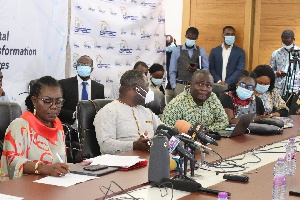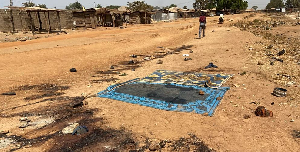The Government of Ghana has signed a partnership agreement deal with the International Telecommunication Union (ITU) and the Norwegian Government aimed at the continuous support of the Digital Transformation Centre (DTC) in the country.
The task spearheaded by the Minister of Communications, Mrs. Ursula Owusu-Ekuful seeks at scaling up and strengthening digital skills training for underserved communities in Ghana, in collaboration with Cisco and the Ghana Investment Fund for Electronic Communications (GIFEC).
At the launch held virtually yesterday with other world leaders to sign the agreement, Mrs. Ursula Owusu revealed the initiative would provide 14,000 Ghanaian citizens with job-ready digital skills, in particular women entrepreneurs, pupils, teachers and marginalized groups, through 200 centres across the country.
According to her, the new partnership will help Digital Transformation Centres, in particular, Ghana to accelerate building an inclusive digital society, to ensure that lack of knowledge and skills is not a barrier to participation in the digital economy, and to contribute to the achievement of the 2030 Sustainable Development Agenda.
"Since 2017, The Ministry of Communications, through the Ghana Investment Fund for Electronic Communications (GIFEC), has provided telecommunications connectivity to over 2,000 communities as part of the flagship Rural Telephony Project, enhancing the socio-economic lives of over 1,200,000 citizens in rural Ghana. We are in the process of expanding access to an additional 2016 communities to connect some 3 million people thereby providing 95% of our population with voice and data connectivity within the next 18 months.
"That is some of the use we are putting our universal access fund to and have secured a credit facility to finance this project upfront. Ghana has the second highest data penetration rate and the fastest growing mobile money market in Sub-Saharan Africa according to Oxford Business Group. It is therefore imperative that we scale up efforts to ensure that these developments are available in, within the reach of and experienced by everybody living in any part of the country if indeed, we are to leave no one behind as we desire."
She added, "Despite these efforts to facilitate the expansion of ICT to rural areas, there is still a wide digital skill gap between citizens in the urban and rural areas. We are therefore delighted that the International Telecommunications Union (ITU) has included Ghana in the Digital Transformation Centres (DTC) programme, which will facilitate the development of digital skills for citizens mainly at the basic and intermediate level. The initiative is part of a broader goal of building an inclusive digital society where lack of digital skills will not be a barrier to participation in the digital economy.
"We are especially grateful to the Norwegian government for their support for this programme, and to Cisco for the provision of content for the training. Gvv providing all our citizenry with ICT skills is fundamental for socio-economic development, these skills will enable the beneficiaries to learn how to use ICT as both a tool and facilitator of progress and financial independence. This is the fundamental goal of our President. Without the requisite digital skills, the bulk of our population will be unable to enjoy the benefits of the many digital interventions undertaken by this government to formalise the economy, promote greater efficiency, and transparency and reduce corruption."
The Secretary-General of the International Telecommunication Union, Houlin Zhao on his part expressed satisfaction over the partnership adding that, the Digital Transformation Centre initiative targets people who need basic digital skills to use digital tools and access e-services and those who seek to enhance their basic and intermediate skills.
Business News of Friday, 13 November 2020
Source: thepublisheronline.com













